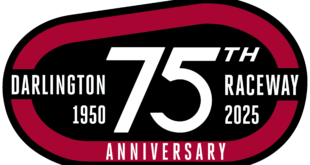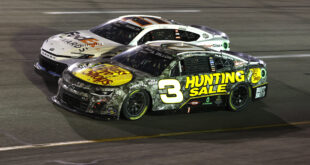On a weekend that is a holiday to not exactly celebrate, but honor, those who are not here after defending our freedom, NASCAR puts on the ultimate test of driver, team, and equipment.
During a year where the equipment is new, and also sometimes hard to find, this becomes the true test of endurance, especially during a time when the endurance of America is being tested. It’s no secret that the citizens are tired, and money is tighter than ever. Prices go up, but wages aren’t, and costs to travel have increased just as much. The country is tired of feeling restricted, and having to pinch pennies just to have enjoyment.
What NASCAR, and for that matter IndyCar and F1, are trying to do is give the people that did spend their money on tickets, hotels, and gas something to enjoy, make their money worth the effort.
At the same time, this weekend is not about the people in the stands. What it is about is the names that could not make it. The ones buried in Arlington, or the soldiers we don’t know that are honored with a wreath. Fans this weekend will root for their favorite driver and team, but before that ever occurs will be sorrow, and tears. Bagpipes, a salute, and TAPS all preclude the moment engines fire up.
Unless you have been there to experience the feeling of seeing soldiers perform drills on the infield, then many of them lining up on the straightaway in formation.
Or the overwhelming joy that a family gets when they attend the race, only to be surprised when a car pulls up and it’s their son, daughter, wife or husband emerges after returning home from duty. That is when the tears of everyone begin to flow, for happiness.
That is what this event means, and what this weekend means. It’s not about 600 miles to victory, it’s 600 miles of remembrance.
To attend this race on two separate occasions, back-to-back no less, and hearing the roar of the crowd when a soldier sings a patriotic song, or honors the ones that paved the foundation of this country that has stood the test of time since 1776, it never gets old. It’s seeing the cars on the track draped in the colors of the American Flag, but having the name of a soldier who is no longer with us on the window. On this day, they don’t race for a win, although all want to win the sport’s longest race.
Instead, they race…FOR THEM.
We are dusting off the sport’s most somber race, but are doing so with a sold out crowd, showing that America still is proud, still has strength, and still has fight. We’ve experienced a lot of trials in the last two years, and it’s not felt like we have still become as one. With all this country has endured with a pandemic, anger, frustration, and anxiety of what could be next, it reminds me of what Johnny Cash did as the country neared it’s bicentennial. Sitting in Binghamton, New York, shortly after a war that many thought we weren’t part of, he wrote about a flag that had seen a lot of time, and hurt, but still was here.
I end this Dustin Off piece with his words, some that this country needs to remember now, more than ever.
I walked through a county courthouse square, and on a park bench an old man was sitting there. I said, “Your old courthouse is kinda run down.” He said, “Nah, it will do for our little town.” I said, “Your old flag pole is kinda leaned a little bit, and that’s a ragged old flag you have hanging on it.”
He said, “Have a seat,” and I sat down, “Is this the first time you’ve come to our little town?” I said, “I think it is,” then he says, “I don’t like to brag, but we’re kind of proud of that ragged old flag.”
You see, we got a little hole in that flag there when Washington took it across the Delaware. It got powder burned the night Francis Scott Key set up watching it writing, “Oh say can you see.” It got a little rip in New Orleans with Packingham and Jackson tugging at it seams. It almost fell at the Alamo beside the Texas flag, but she waved on though. It got cut with a sword at Chancellorsville, and got cut again at Shiloh Hill. There was Robert E. Lee, Beauregard, Bragg, and the south wind blew hard on that ragged old flag.
On Flander’s Field in World War I, she took a bad hit from a bertha gun. She turned blood red in World War II; she hung limp, and low, by the time that one was through. She was in Korea, Vietnam; she went where she was sent by her Uncle Sam. She got badly mistreated in Iran, but got a tinker tape welcome back home again.
But in our own good land here, she’s been abused. She’s been burned, dishonored, denied, refused, and the very government for which she stands is scandalized throughout the land. She’s getting threadbare, and wearing kind of thin, but she’s in good shape for the shape she’s in. Cause she’s been through the fire before, and she can take a whole lot more. So we raise her up every morning; we bring her down slowly every night. We don’t let her touch the ground, and we fold her up right.
On second thought, I do like to brag. Cause I’m mighty proud of that ragged old flag.
 All About Horse Power Motorsports 24/7
All About Horse Power Motorsports 24/7



